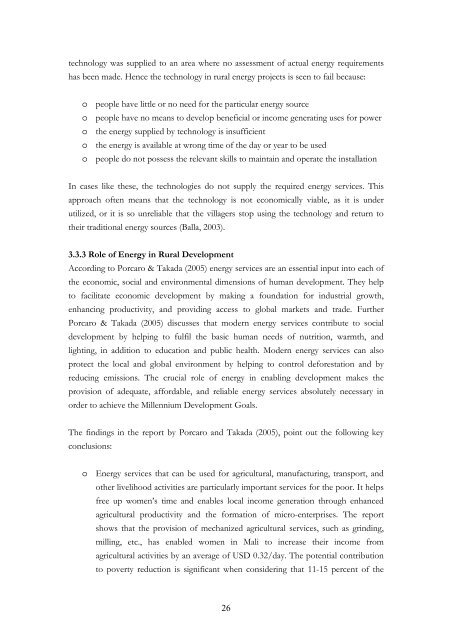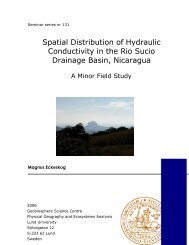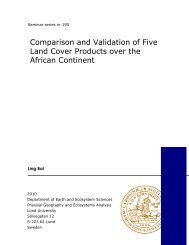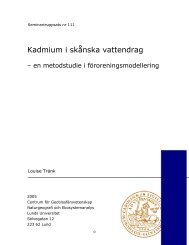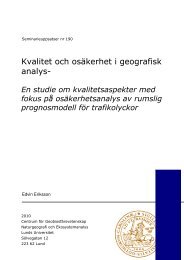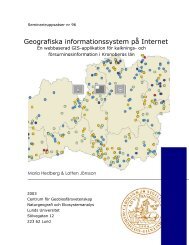Finding Potential Sites for Small-Scale Hydro Power in Uganda: a ...
Finding Potential Sites for Small-Scale Hydro Power in Uganda: a ...
Finding Potential Sites for Small-Scale Hydro Power in Uganda: a ...
You also want an ePaper? Increase the reach of your titles
YUMPU automatically turns print PDFs into web optimized ePapers that Google loves.
technology was supplied to an area where no assessment of actual energy requirementshas been made. Hence the technology <strong>in</strong> rural energy projects is seen to fail because:o people have little or no need <strong>for</strong> the particular energy sourceo people have no means to develop beneficial or <strong>in</strong>come generat<strong>in</strong>g uses <strong>for</strong> powero the energy supplied by technology is <strong>in</strong>sufficiento the energy is available at wrong time of the day or year to be usedo people do not possess the relevant skills to ma<strong>in</strong>ta<strong>in</strong> and operate the <strong>in</strong>stallationIn cases like these, the technologies do not supply the required energy services. Thisapproach often means that the technology is not economically viable, as it is underutilized, or it is so unreliable that the villagers stop us<strong>in</strong>g the technology and return totheir traditional energy sources (Balla, 2003).3.3.3 Role of Energy <strong>in</strong> Rural DevelopmentAccord<strong>in</strong>g to Porcaro & Takada (2005) energy services are an essential <strong>in</strong>put <strong>in</strong>to each ofthe economic, social and environmental dimensions of human development. They helpto facilitate economic development by mak<strong>in</strong>g a foundation <strong>for</strong> <strong>in</strong>dustrial growth,enhanc<strong>in</strong>g productivity, and provid<strong>in</strong>g access to global markets and trade. FurtherPorcaro & Takada (2005) discusses that modern energy services contribute to socialdevelopment by help<strong>in</strong>g to fulfil the basic human needs of nutrition, warmth, andlight<strong>in</strong>g, <strong>in</strong> addition to education and public health. Modern energy services can alsoprotect the local and global environment by help<strong>in</strong>g to control de<strong>for</strong>estation and byreduc<strong>in</strong>g emissions. The crucial role of energy <strong>in</strong> enabl<strong>in</strong>g development makes theprovision of adequate, af<strong>for</strong>dable, and reliable energy services absolutely necessary <strong>in</strong>order to achieve the Millennium Development Goals.The f<strong>in</strong>d<strong>in</strong>gs <strong>in</strong> the report by Porcaro and Takada (2005), po<strong>in</strong>t out the follow<strong>in</strong>g keyconclusions:o Energy services that can be used <strong>for</strong> agricultural, manufactur<strong>in</strong>g, transport, andother livelihood activities are particularly important services <strong>for</strong> the poor. It helpsfree up women’s time and enables local <strong>in</strong>come generation through enhancedagricultural productivity and the <strong>for</strong>mation of micro-enterprises. The reportshows that the provision of mechanized agricultural services, such as gr<strong>in</strong>d<strong>in</strong>g,mill<strong>in</strong>g, etc., has enabled women <strong>in</strong> Mali to <strong>in</strong>crease their <strong>in</strong>come fromagricultural activities by an average of USD 0.32/day. The potential contributionto poverty reduction is significant when consider<strong>in</strong>g that 11-15 percent of the26


